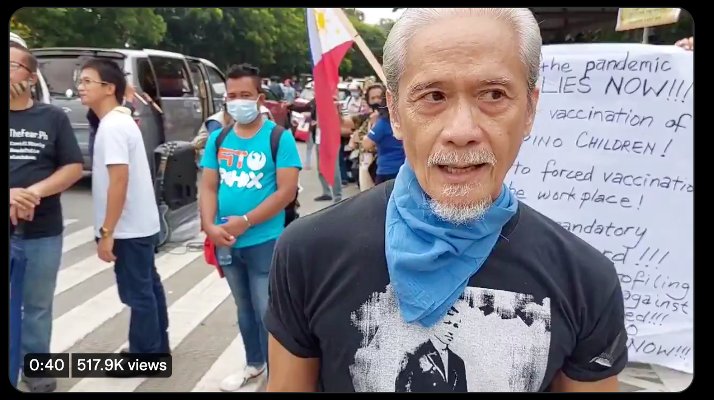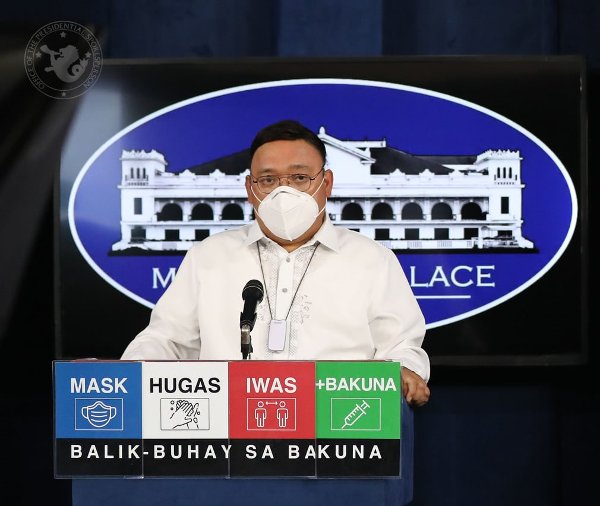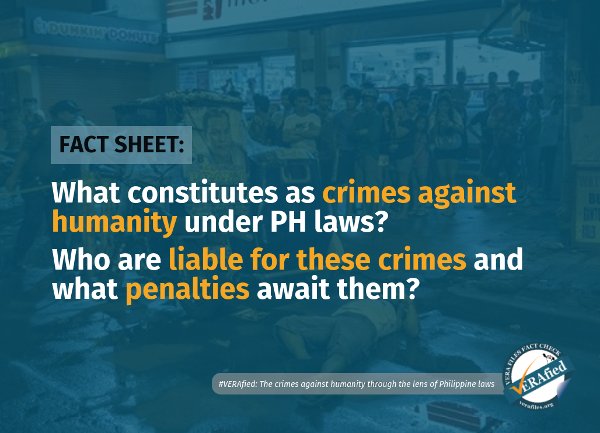Disagreeing on the use of face masks as protective gear, actor Crispin “Pen” Medina claimed the novel coronavirus “can go through any mask” because it is extremely small. This lacks context.
Medina also wrongly stated that the virus which causes the coronavirus disease 2019 (COVID-19) has not yet been identified. VERA Files Fact Check already debunked this claim in 2020.
STATEMENT
In an Aug. 26 interview with DZBB Super Radyo reporter Sam Nielsen during an anti-lockdown and anti-mandatory vaccination rally in front of the Senate offices in Pasay City, Medina said:
“Napag-aralan ko na … kasi po ang face mask malalaki ang hibla niyan. ‘Yun pong coronavirus, ang mga virus, maliliit po, kumbaga hindi pa rin ito na-identify. Kumbaga sa line up ng pulis, hindi pa na-pinpoint kung sino yung kriminal na virus … Hindi pa po nila nakita ‘yan, tapos may sinasabi nang variant. At ‘yan po lulusot po kahit na anong mask dahil sobra-sobrang pagkaliit-liit.”
(I have studied that … face masks have big fibers. The coronavirus, the viruses are tiny, as in, they have not identified those. Just like in a police lineup, they have not yet pinpointed the criminal virus … They haven’t seen it and yet they’re saying there are already variants. These can go through any mask because they are extremely small.)
Source: Twitter account of DZBB Super Radyo, WATCH: Aktor na si Pen Medina, hindi naniniwalang epektibo ang paggamit ng face mask kontra COVID-19. Sinusuportahan din niya ang hindi sapilitang pagbabakuna, Aug. 26, 2021
The 44-second video clip, which was part of a live tweet thread, has gained over 523,000 views as of Sept. 3.
The rally was organized by Gising Maharlika, whose Facebook (FB) page has a history of sharing disinformation about the COVID-19 vaccines.
The same video was published on the official FB page of DZBB Super Radyo. As of Sept. 3, it had more than 72,000 views and 1,800 reactions on the platform.
FACT
The wearing of face masks is one of the minimum public health standards recommended by the World Health Organization (WHO), the Department of Health, and its many counterparts around the globe, to help reduce the chances of SARS-CoV-2, which causes COVID-19, from spreading from one person to another.
The novel coronavirus, identified in China on Jan. 7, 2020, can spread from an infected person’s mouth or nose in small liquid particles—ranging from “larger respiratory droplets to smaller aerosols”—when they cough, sneeze, speak, sing, or breathe, according to the WHO.
In an Aug. 31 media forum, Health Undersecretary Rosario Singh-Vergeire explained that masks have long been used against infectious diseases, even before the COVID-19 pandemic.
“[Medical-grade masks] can filter the small particulate matters including these viruses, even non-COVID illnesses, that can be transmitted through droplet infection or in an enclosed setting where the virus may linger longer in the air,” she said in a mix of English and Filipino.
A group of public health experts from global technology nonprofit Meedan also said wearing masks can protect people from coming into direct contact with the COVID-19 virus.
In an explainer on their website HealthDesk.org, the experts said:
“Research shows that masks help stop germs from getting out into common spaces while also reducing the amount of germs inhaled by mask wearers, which can help reduce the chances of more severe disease.”
But Meedan’s experts also pointed out other important considerations that will affect the effectiveness of mask-wearing, such as the quality of the mask, the amount of layers it has, and how many people are wearing them in a specific area.
Below are different types of mask recommended for certain groups of people:
The WHO has reminded the public to wear face masks properly to maximize their protection, citing that “when the edges of the mask are not close to the face and shift, such as when speaking, air penetrates through the edges of the mask rather than being filtered through the fabric.”
While helpful in reducing the spread of the virus, the wearing of masks and other personal protective equipment (PPE) alone does not stop transmission completely, Meedan’s experts said.
“The virus is very, very tiny and can still escape the physical protection of PPE and enter your body,” they said, and stressed the importance of vaccination to prepare one’s immune system to fight SARS-CoV-2.
Hence, it is recommended to practice a “do-it-all approach:” observing physical distancing, avoiding crowded settings, ensuring proper ventilation, thoroughly washing the hands, covering sneezes and coughs, and getting vaccinated.
Sources
DZBB Super Radyo, WATCH: Aktor na si Pen Medina, hindi naniniwalang epektibo ang paggamit ng face mask kontra COVID-19. Sinusuportahan din niya ang hindi sapilitang pagbabakuna, Aug. 26, 2021
Super Radyo DZBB 594 khz, WATCH: Aktor na si Pen Medina, hindi naniniwalang epektibo ang paggamit ng face mask kontra COVID-19. Sinusuportahan din niya ang hindi sapilitang pagbabakuna, Aug. 26, 2021
Department of Health, DOH Beat COVID-19 Media Forum, Aug. 31, 2021
World Health Organization, Transmission of SARS-CoV-2: implications for infection prevention precautions, July 9, 2020
World Health Organization, Coronavirus disease (COVID-19): How is it transmitted?, Dec. 30, 2020
Infographic
- World Health Organization, Coronavirus disease (COVID-19): Masks, Dec. 1, 2020
- Journal of Education and Health Promotion, Efficacy of cloth face mask in prevention of novel coronavirus infection transmission: A systematic review and meta-analysis, July 28, 2020
- Innovation for Poverty Action, The Impact of Community Masking on COVID-19: A Cluster-Randomized Trial in Bangladesh, Aug. 31, 2021
- National Library of Medicine, Optical microscopic study of surface morphology and filtering efficiency of face masks, June 26, 2019
- Mayo Clinic, How well do face masks protect against coronavirus?, Aug. 24, 2021
- Johns Hopkins Medicine, Coronavirus Face Masks & Protection FAQs
- Stanford Medicine, Surgical masks reduce COVID-19 spread, large-scale study shows, Sept. 1, 2021
Meedan, Does wearing a mask protect the mask wearer?, Feb. 17, 2021
Meedan Health Desk, How are vaccines and masks different when it comes to protecting against COVID-19?, June 1, 2021
(Guided by the code of principles of the International Fact-Checking Network at Poynter, VERA Files tracks the false claims, flip-flops, misleading statements of public officials and figures, and debunks them with factual evidence. Find out more about this initiative and our methodology.)




